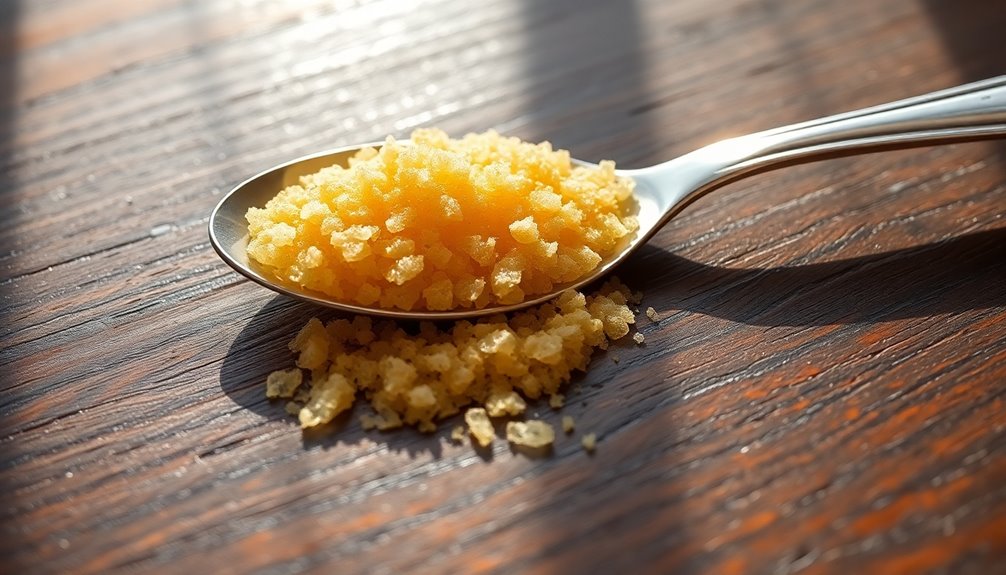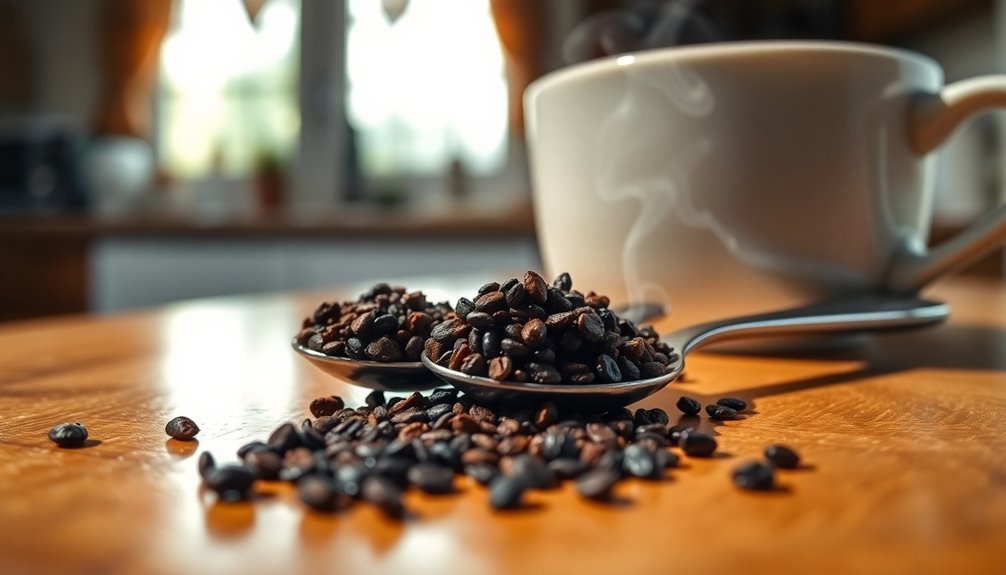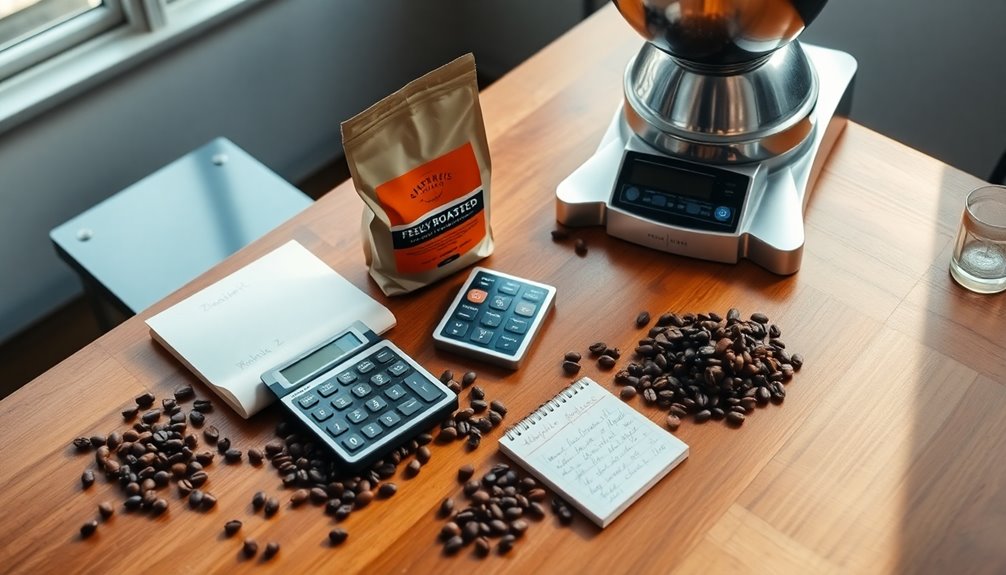Two teaspoons generally weigh between 8 to 12 grams, but this varies based on the ingredient. For instance, two teaspoons of granulated sugar weigh about 8.4 grams, while two teaspoons of salt measure around 11.8 grams. If you're using heaped teaspoons, the weight increases; two heaped teaspoons of sugar could total approximately 15 grams. Accurate measurements are key in cooking and baking, as ingredient density can cause significant differences in weight. Want to know how to convert other measurements or guarantee your recipes succeed? There's more helpful info waiting for you!
Key Takeaways
- Two teaspoons of granulated sugar weigh approximately 8.4 grams.
- Two teaspoons of salt weigh around 11.8 grams.
- Heaped teaspoons can increase weight; for sugar, it may total about 15 grams.
- Ingredient density affects weight, emphasizing the need for specific measurements.
- Accurate weight measurements are crucial for recipe success and ingredient tracking.
Understanding Teaspoon Measurements
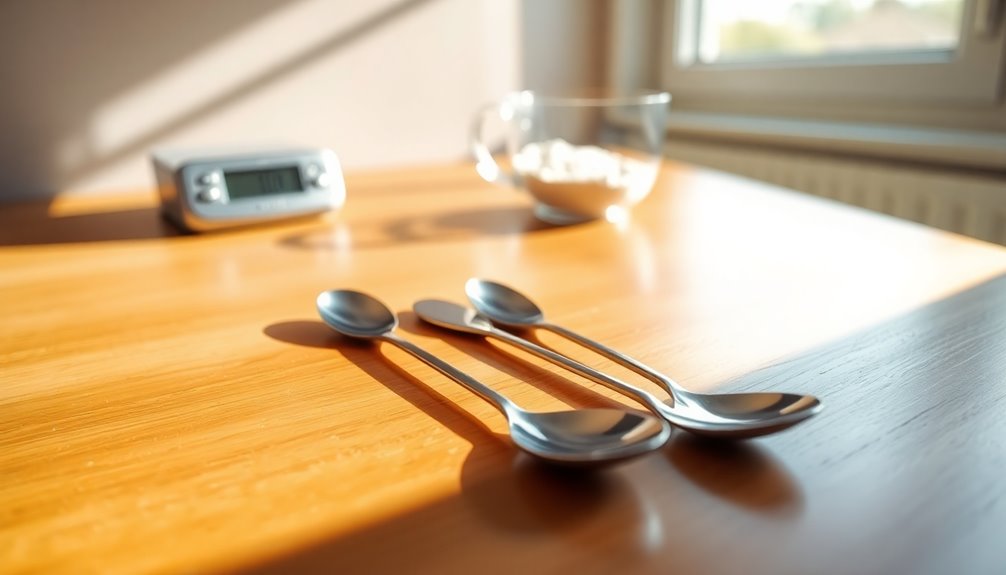
When it comes to measuring ingredients, understanding teaspoon measurements is crucial for accuracy in your cooking. A US teaspoon is roughly 5 mL, while an imperial teaspoon is about 6 mL.
The weight of a teaspoon varies by ingredient due to differences in density; for example, a teaspoon of sugar weighs around 4.2 grams, whereas a teaspoon of salt weighs about 5.9 grams.
This variance means that relying solely on teaspoons can lead to inaccuracies in your recipes. For precise cooking and baking, using grams is often a better choice, especially with ingredients of differing densities.
Knowing the conversion between teaspoons and grams guarantees you achieve an accurate conversion, enhancing your results in the kitchen. Additionally, being mindful of consistent measurements can significantly improve your cooking outcomes.
Grams in Two Teaspoons
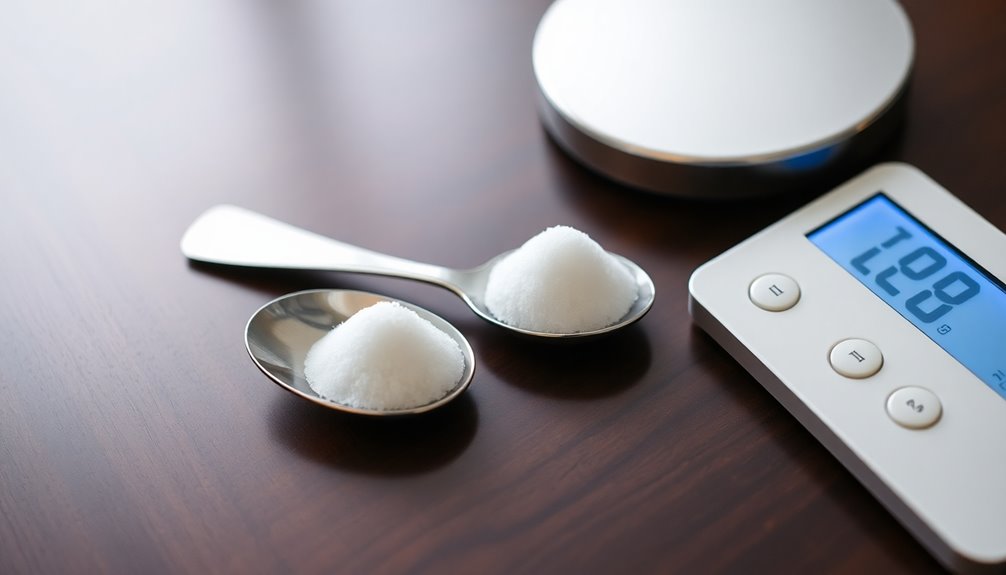
Measuring two teaspoons of various ingredients can yield different weights, making it essential to know what you're working with.
For instance, two teaspoons of granulated sugar weigh about 8.4 grams, as one teaspoon of sugar equals approximately 4.2 grams. In contrast, two teaspoons of salt weigh around 11.8 grams since one teaspoon of salt is about 5.9 grams.
The weight of your two teaspoons can vary considerably due to density differences among ingredients. If you use a heaped teaspoon of sugar, it might weigh around 7.5 grams, totaling roughly 15 grams for two heaped teaspoons.
For accurate measurement, always consider the specific density of the ingredient you're using and make the necessary conversions.
Converting Teaspoons to Grams
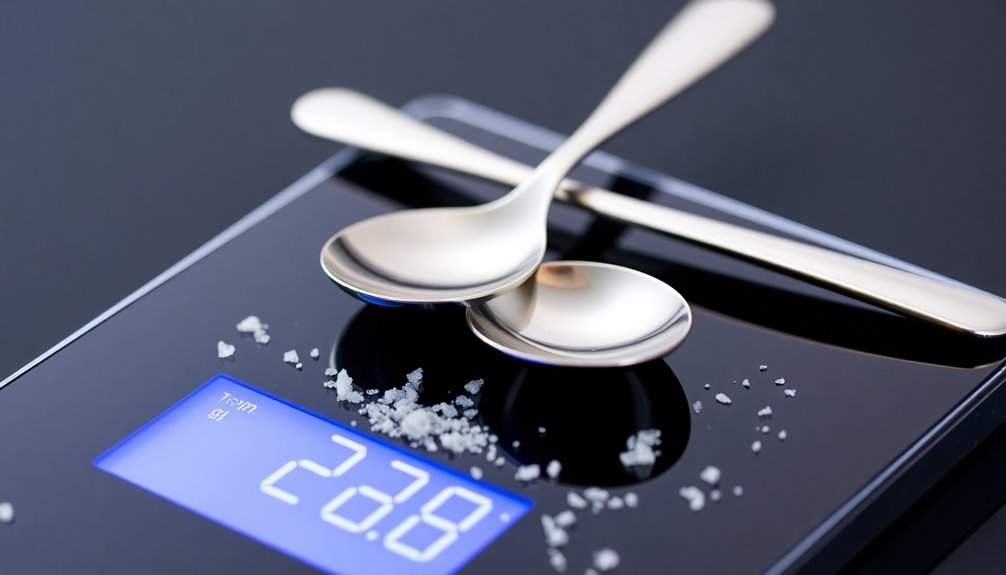
Converting teaspoons to grams is essential for accurate cooking and baking, as different ingredients have unique densities. To achieve precise measurements, you can use the formula: grams = teaspoons × density. Here's a quick reference table for some common ingredients:
| Ingredient | Teaspoons | Grams |
|---|---|---|
| Granulated Sugar | 1 | 4.2 |
| Salt | 1 | 5.9 |
| Flour | 1 | 2.6 |
| Brown Sugar | 1 | 7.0 |
| Baking Powder | 1 | 4.6 |
Understanding dilution guidelines is also important when working with certain ingredients, especially in the context of essential oils.
Importance of Accurate Measurements
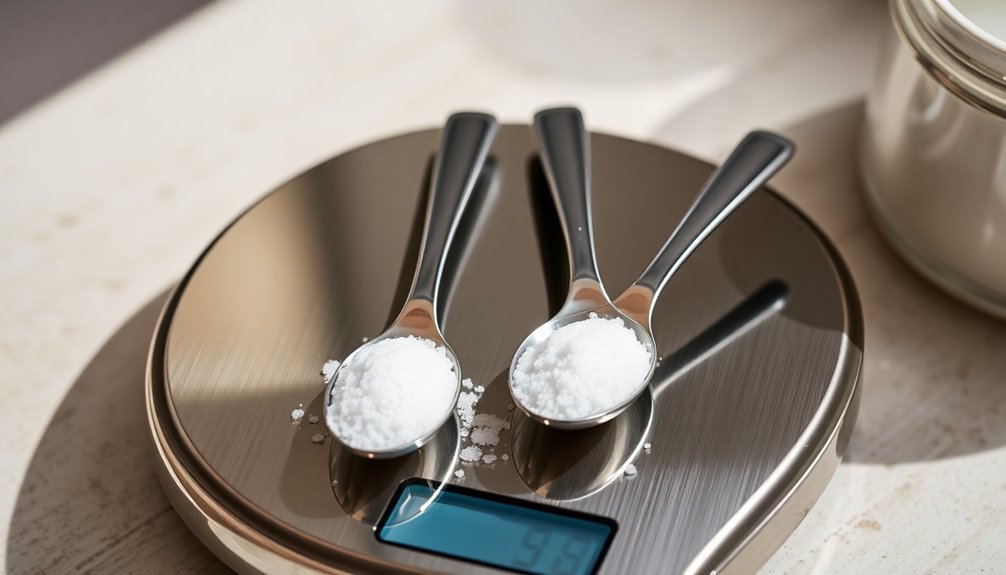
Accurate ingredient measurements directly influence the success of your recipes. Even small discrepancies can greatly alter the final outcome.
For instance, the weight of 2 teaspoons varies by ingredient—2 teaspoons of granulated sugar weigh around 8.4 grams, while 2 teaspoons of salt weigh about 11.8 grams. This variance is due to density differences among ingredients, making accurate measurements essential for consistent results in cooking and baking.
Utilizing conversion tables and calculators can help you translate volume into weight, ensuring you're using the right amount of each ingredient.
By understanding the importance of precise measurements, you can prevent recipe failures and create dishes as intended. Additionally, using proper storage techniques for ingredients like butter can help maintain their quality and ensure accurate measurements in your recipes.
Practical Applications of Conversions
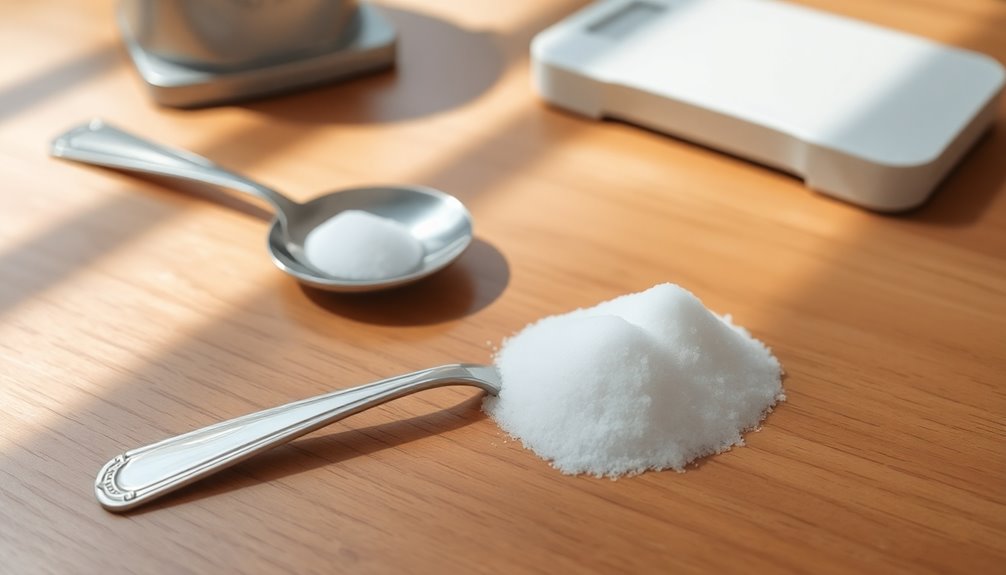
Understanding weight conversions is vital in everyday cooking and baking. Accurate measurements guarantee your dishes turn out just right.
Here are three practical applications of conversions:
- Recipe Adjustments: Converting teaspoons to grams allows you to modify ingredient amounts without compromising the dish's quality.
- Nutritional Tracking: Knowing the weight of ingredients in grams helps you monitor your intake effectively, especially for diet planning.
- Scientific Precision: In baking or chemistry, understanding density and accurate conversions is essential for successful results. Additionally, being aware of nutritional benefits can also guide ingredient choices for healthier meals.
Frequently Asked Questions
How Much Does 1 Tsp Weigh?
When you measure one teaspoon, its weight can vary based on the ingredient. For instance, granulated sugar weighs about 4. 2 grams, while table salt is heavier at around 5. 9 grams. When considering other common ingredients, the weight can fluctuate even further; for example, a teaspoon of cocoa powder may only weigh about 2. 5 grams. This variability is crucial for precision in cooking and baking. Therefore, when someone asks, “how much does salt weigh in grams,” it’s essential to note that different types of salt may also have different weights, affecting recipes significantly.
If you're measuring water, one teaspoon weighs approximately 5 grams.
Since different substances have different densities, it's essential to know their specific weights for accurate cooking.
Using a scale for precise measurements in grams rather than relying solely on teaspoons is often the best practice.
Is a Teaspoon 2 Grams?
Think of a teaspoon as a tiny treasure chest; its contents can weigh differently depending on what's inside.
So, is a teaspoon just 2 grams? Not quite. A standard teaspoon typically weighs about 4.9 grams, but that can change based on the ingredient.
For accurate cooking or baking, it's best to measure with a scale.
How Much Does 2 Tsp of Flour Weigh?
When you measure 2 teaspoons of all-purpose flour, it typically weighs about 6.6 grams.
Keep in mind that the weight can vary depending on how you pack the flour or the type you use.
For accuracy, you should consider using a kitchen scale rather than just relying on teaspoons.
A level teaspoon is best for consistent results in your baking or cooking, ensuring your recipes turn out as intended.
How Much Does 1 Tsp Weigh in Oz?
Weighing one teaspoon is like discovering a hidden gem in your kitchen. It's about 0.1739 ounces, a small but mighty measurement that can make a big difference in your recipes.
When you're cooking or baking, precision matters, and knowing this helps you achieve the perfect balance of flavors.
Just remember, the weight can change depending on what you're measuring, so always consider the density of the ingredient for accurate results.
Conclusion
In the kitchen, two teaspoons symbolize the delicate balance of flavor and precision. Just like a painter carefully mixes colors, you measure ingredients to create culinary masterpieces. Knowing that two teaspoons weigh around 10 grams helps you wield your measuring tools like a maestro conducting an orchestra. Remember, each measurement is a note in your recipe symphony, and accuracy guarantees your dish resonates with the perfect harmony of taste. Embrace the art of measurement, and let your creations shine!
